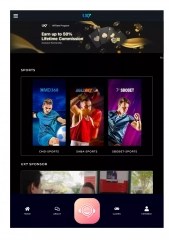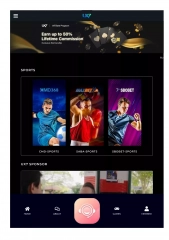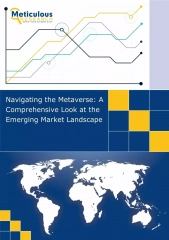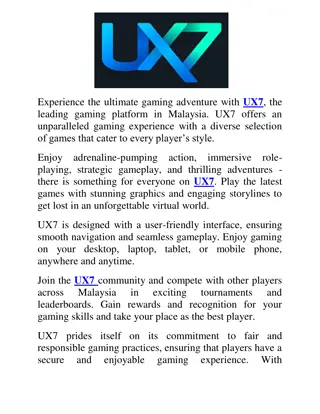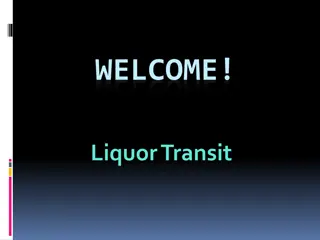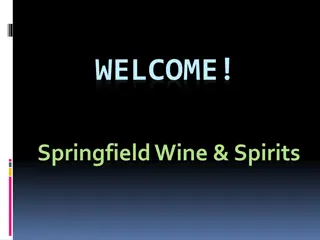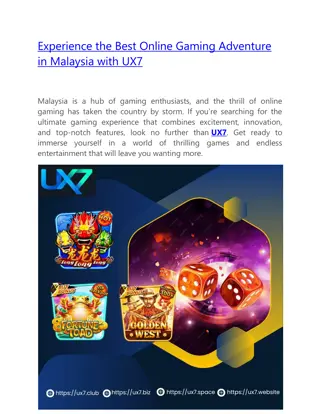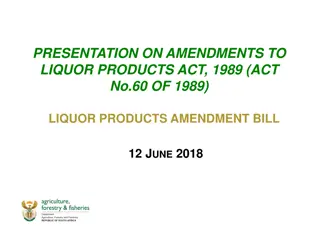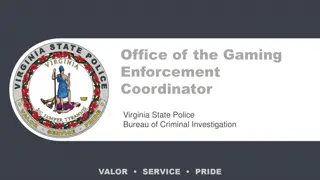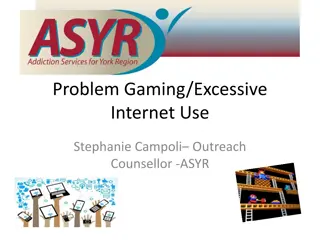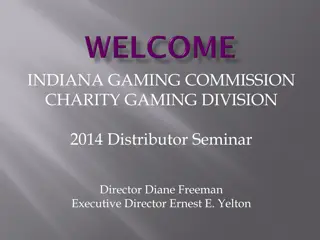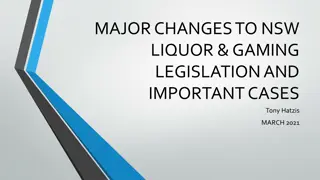Liquor & Gaming Update 2019 by Tony Hatzis
Significant updates in liquor and gaming regulations for 2019 presented by Tony Hatzis, including new guidelines, caselaw insights, and NCAT decisions on various licensing matters. The cases discussed involve removal of licenses for business purposes, assessment of community impact, and considerations for granting licenses in different scenarios.
Download Presentation

Please find below an Image/Link to download the presentation.
The content on the website is provided AS IS for your information and personal use only. It may not be sold, licensed, or shared on other websites without obtaining consent from the author. Download presentation by click this link. If you encounter any issues during the download, it is possible that the publisher has removed the file from their server.
E N D
Presentation Transcript
LIQUOR & GAMING UPDATE 2019 PRESENTED BY: TONY HATZIS
Outline Significant Cases: NCAT / L&E /Supreme Court New Guideline 10 (Supermarkets and General Stores) Section 30 New Section 68A Gaming Machines Act New Training Regime ILGA requirements on ETA application
Caselaw A troika of NCAT decisions Young, Kurri Kurri and Gunnedah NCAT M J Trading Services (Supermarket and General Store) Section 31 NCAT Appeal Panel:- ALDI Young Points of Law NCAT - DPR Limited Availability of Merits Review (and Rogers) Supreme Court Rogers Campsie Litigation Thomlinson L & E Court Decisions: Redcape Cirillo Suh
NCAT ALDI Young Removal of hotel licence to be used as a supermarket liquor department 45(4)(c) requires DA to use the premises for the purposes for the business or activity to which the proposed licence relates . Held This relates to the actual activity or business to be carried out, not an activity which matches the licence type. Guideline 6 Desirable to follow existing policy guidelines. Reject applicant s submission that primacy should be given to the views of the community in the CIS process Assessment is a multi-factorial one taking into account Act s objects, mandatory considerations and CIS objects. Neither party bears any onus. In determining density, unrealistic to include dormant and highly-limited licences.
NCAT ALDI Young Rejected applicant s argument that removal of hotel licence and use for packaged liquor would reduce the social impact. Take existing licence as dormant. Not satisfied that grant of licence would be likely to cause harm which would outweigh the benefits of convenience and public support (1900 petitioners) Application granted.
NCAT Kurri Kurri Reject ILGA argument that evidence not before ILGA to be subjected to particular scrutiny. Reject ILGA argument that ILGA s decision to be given considerable weight . Neither party has an onus of proof. Nor is it helpful to speak of a practical onus. Focus on incremental impact of granting the licence and whether that will be detrimental to the wellbeing of the local or broader communities. Not simply a matter of whether existing levels of alcohol-related harm are more, or less than, State average. Need some evidence from which can infer that the grant of the licence would cause harm. Mere conjecture of likely or possible harm is insufficient.
NCAT Kurri Kurri Guideline 6 is a policy to which NCAT may have regard. Expressed doubt as to whether the broader community always equates to an LGA, as stated in Guideline 6. Identifying the local and broader community question of fact. Open to be contested. Competing petitions (385 plus 321 for; 436 against). Views that a community is already sufficiently provided for are irrelevant. BOCSAR article (Donnelly) enabled NCAT to draw an inference that the increased licence density in the LGA from granting the application would be likely to give rise to an upturn in DV and non-DV assault. Cessnock LGA had density of 1.02 PLL per 1000 of population, which would increase to 1.04 if application granted. More than the tipping point (0.75) in the BOCSAR research. Rejected applicant s argument that applied BOCSAR research to local community.
NCAT Kurri Kurri Not persuaded by economist argument that there would be no increase in alcohol consumption but only transfer between incumbent retailers, as economist had not taken account of BOCSAR research. Application refused.
NCAT ALDI Gunnedah Agreed with reservation in Kurri Kurri that local and broader communities do not always equate with LGA and suburb, but not in contest on the facts. No onus of proof and no merit in suggesting a practical onus. Gunnedah had high licence density, high rates of crime, low SEIFA and high rates of alcohol-related casualty crashes. ILGA called an economist with expertise in analysing epidemiological studies. His evidence was that the increase in licence density (up to 0.51 per 1,000) would be likely to result in an increase in assaults. Member found the increased density is likely to result in some harm with an increase in DV assaults probable, but likely to be small. Given the high rates of assaults in Gunnedah, caution was to be exercised, even if the assault increase was to be small. Found likely to be a small increase in hospital admissions.
NCAT ALDI Gunnedah Rates of alcohol-related crashes are cause for concern. While harm is likely to be small, has the potential to be very real in a community which has too much alcohol-related violence and alcohol- related crashes. The likely harms outweigh the benefits of convenience, greater market choice, economic benefits and reducing traffic volumes and pressure on parking in the town. Application refused.
NCAT M J Trading Services: Section 31 Merits appeal following ILGA refusal of PLL. Whether Korean grocery store 180 square metres was a general store within sec 31. General Store means a convenience store, mixed business shop, corner shop or milk bar that has a retail floor area of not more than 240 square metres and that is used primarily for the retail sale of groceries or associated small items . Sec 31 based on Victorian legislation, sec 22 Liquor Control Reform Act. Extensive Victorian caselaw on meaning of the phrase. Not at all referred to in the NCAT proceedings. Victorian decisions suggest the phrase is a compendious one, conveying one concept. A hendiadys. (Second Reading Speech and policy underlying sec 31 not referred to in NCAT).
NCAT M J Trading Services - Section 31 In 1999 amending Act Minister said Section 31 to prevent liquor being sold as an ordinary commodity alongside milk, bread, ice creams, newspapers etc. Victorian decisions first sought to characterise premises to determine if they were a corner shop, milk bar, mixed business or convenience store. In Victoria, shops have been held to fall outside that expression including: Old-fashioned grocery store with self-service: Blanche Organic specialty store Small IGA store held to be a supermarket Jones the Grocer (specialty store selling gourmet foods). o o o o
NCAT M J Trading Services - Section 31 In M J, the Korean supermarket held: Not to be a milk bar as no milk drinks, ice cream or sandwiches sold there. Not a convenience store as did not offer a range of food and domestic items most commonly in demand. To be a corner store being a small local shop selling a range of goods for domestic consumption . To be a mixed business, being a small grocery shop. Member referred to planning law cases where a supermarket use was within the ambit of a development approval for a general store . Said that these planning cases did not preclude the supermarket from meeting the definition of a general store . Sec 31 permits licence to be granted if no other takeaway facility reasonably available in the neighbourhood. Neighbourhood defined as a large part of suburb of Lidcombe. Within that neighbourhood, 3 hotels and 1 packaged liquor outlet. Application refused. o o o o
Guideline 10 New guideline dated 14 December 2018. Deals with supermarket and other businesses which have a packaged liquor department and where the primary purpose of the supermarket/other business is not the sale of alcohol. Sec 30 requires a liquor sales area which is adequately separated from the remaining area. Sec 30 requires the principal activity carried out in the liquor sales area to be the sale or supply of liquor for off-premises consumption. Liquor must not be visible to persons entering or shopping in the supermarket (other than by looking through the entrance to the liquor sales area or at the checkout).
Guideline 10 Any walls or barriers separating the liquor sales area from other areas must be opaque and to a minimum height of 1.8 metres. Applicants to specify opaque walls or barriers on plan filed with applications. If there is only one mixed-use checkout in the liquor sales area it is generally accepted that principal activity is the sale or supply of liquor. If more than one mixed-use checkout, may look at totality of activities to see if principal activity in the liquor sales area is the sale of liquor. Safe harbour provision if 75% or more of sales from the mixed-use checkout are liquor, will generally be accepted that the principal activity test is met.
ALDI Young Points of Law Appeal to Appeal Panel of NCAT on points of law argued by ILGA as follows: Section 45(3)(c) Whether DA required for a hotel or supermarket liquor department. As the relevant premises were a supermarket, they could not satisfy the hotel primary purpose test: sec 15. The power to approve the removal of a hotel licence cannot be exercised to permit removal of a hotel licence to be conditioned for use only as a packaged liquor licence. All of these contentions rejected by Appeal Panel. Except for sec 45(3)(c), these points had not been raised at first instance. Question of whether they can be raised on appeal. Appeal Panel allowed them to be raised as a matter of discretion. On sec 45(3)(c), ILGA s argument rejected as it would require a readily-identifiable corresponding business or activity to be identified for each type of licence. 1. 2. 3.
ALDI Young Points of Law As to sec 15, Appeal Panel found that the relevant premises were the proposed liquor department (33 square metres) and not all of 11 Zouch Street (which housed the supermarket). As the primary purpose of the smaller area would be the sale of liquor, the primary purpose test was satisfied. As to the sec 59 argument: ILGA argued that the categories of licence are mutually exclusive and that holder of a hotel licence must be in the business of operating a hotel as commonly understood. Argument rejected in favour of a flexible system of licensing. ILGA argued there was no power to impose conditions that would convert a hotel licence to a packaged liquor licence. Argument rejected. The categories of licence are not mutually exclusive. No requirement that a hotel licence must exercise the authority to sell liquor for consumption both on and off the premises. Distinguished old South Australian cases. Note new section 159(2A) which potentially gives ILGA discretion to refuse if ILGA considers there is a more appropriate licence type. Appeal to Court of Appeal next week.
Limited Merits Review to NCAT DPR ILGA refused transfer of hotel licence on fitness grounds. Applicant sought merits review to NCAT. Sec 13A GALA Act and cl 7 GALR prescribe circumstances in which a merits review exists. Merits review available where application for grant of a hotel licence is refused. Under sec 60(5), application to approve a licence transfer is to be dealt with and determined as if an application for grant of a licence to that person. Held rights of merits review does not exist at large but is circumscribed. A transfer application is different in nature from the grant of a hotel licence.
Rogers Supreme Court Decision Police applied to revoke the ETA of Sydney Junction Hotel (ETA until 5 am Council consent until 3 am). 51(9)(b) says ETA may be varied or revoked by the Authority on the Authority s own initiative or an application by Police . 51(13) provides Authority must not revoke an authorisation (except on application made by licensee) unless the Authority gives licensee a reasonable opportunity to make submissions in relation to the proposed decision : sec 51(13). After taking submissions, ILGA made interim findings about specific COPS entries and invited further submissions and evidence as to economic prejudice if the ETA were varied, rather than revoked, over a range of different times. 14 June, ILGA notifies parties that it does not revoke the Hotel s ETA, but acts upon its own initiative (51(9)(b)) to vary the ETA to 1.30 am.
Rogers Supreme Court Decision Held, ILGA decision invalid. 51(13) imposed a mandatory pre-condition to the exercise of power namely, to invite submissions in relation to the proposed decision . Licences and ETAs have considerable value and matters of considerable public interest are at stake. Parliament intended the Authority must take into account these matters before exercising power. The April letter was not sufficient communication of the proposed decision as ILGA had not yet decided how the Police application to revoke ETA was to be resolved. It was not a communication of a proposed decision . Decision set aside.
Rogers Supreme Court Decision Merits Review Rogers argued that if he been told that ILGA would act of its own motion , Rogers would have argued against ILGA doing so as it would have deprived him of a merits review before NCAT. Sec 13A GALA Act provides that a person aggrieved by a decision in relation to a prescribed provision of the gaming and liquor legislation may apply to NCAT for administrative review. Cl 7 sets out the types of applications prescribed. These include: (b) Application for an ongoing hotel ETA that would result in trading after midnight; and (c) Application to vary or revoke a condition of a licence that would result in trading after midnight.
Rogers Supreme Court Decision Rogers argued that if ILGA acted of its own motion , there would be no relevant application to confer jurisdiction on NCAT. Consequently, Rogers would suffer substantial prejudice. Regardless of whether prejudice would be suffered, Judge set aside the decision for failure to comply with a mandatory pre-condition to exercise in power. Judge went on to consider Rogers argument (therefore obiter). Held ILGA s decision was in relation to an application made by Police. So there might still be merits review if application came within cl. 7 GALR.
Rogers Supreme Court Decision However, the application made by Police was to revoke the ETA altogether. If granted, that could not be said to be an application that would result in trading after midnight. Accordingly, no NCAT review. Obiter, if Commissioner had applied to vary ETA for 1.30 am trading, that would have been an application to vary or revoke licence condition that would result in trading after midnight. In that case, an NCAT review would be available. So whether NCAT review was available depended on nature of Commissioner s initial application to ILGA. NCAT Application Simultaneously with seeking judicial review, Rogers made application for merits review to NCAT. NCAT found it had no jurisdiction on a reading of cl 7 GALR, but published no reasons.
Rogers Supreme Court Decision Post-Script ILGA gives notice of proposed decision and invited submissions. Submissions made. ILGA makes same decision 1.30 am variation. Hotel sold. New owners and Rogers seek and obtain a stay of ILGA s decision pending final hearing. New owners make operational changes and there are marked reductions in assault numbers. Police application modified to permit 3 am trading, but with no entertainment post 1.30 am.
Campsie (No 2) Supreme Court Decision New hotel in Campsie (relocated from Hurlstone Park). Question of whether new hotel is in the immediate vicinity of Campsie Public School. If so, then no gaming threshold increase could be granted and gaming threshold must remain at zero. Hotel s back door backed onto a laneway. Campus of public school located 30 metres further along and 70 metres from nearest entry point of Hotel. No direct line of sight between Hotel and school.
Campsie (No 2) Supreme Court Decision ILGA find that Hotel not in immediate vicinity because: Two properties not directly adjacent. Nearest entry point to Hotel 70 metres from school boundary No line of sight Interaction between school users and Hotel patrons will likely occur on a common high street Hotel disconnected physically and visually from the school Orientation of each premises away from the other. Relationship cannot be considered to be immediate . Appeal by commercial objectors. Commercial objectors argued that immediate vicinity should be considered by distance alone. Argument rejected as contrary to the weight of case law. Is open to ILGA to have regard to a variety of facts and that decision regarding immediate vicinity will vary according to context. Distance is but one consideration. The test is designed to protect against interference which might emanate from licensed premises and many facts might be relevant. o o o
State of NSW v Thomlinson Patron forcibly removed by Police from the Shore Club Hotel, Manly. Handcuffed, arrested and driven to a bus stop in a caged vehicle. Sued for assault. Tomlinson succeeded before the District Court. Appeal by Police upheld. Held patron s licence to be on the Hotel could be revoked by the publican at any time and without cause. The premises were not a common inn (cf. previous legislation). Police were requested to assist in his removal and did so. Alternatively, Police were using reasonable force to turn out a quarrelsome patron: sec 77(2)(a) Liquor Act. A person is quarrelsome if they engage in argumentative or confrontational anti-social behaviour usually accompanied by hostility or anger. Nor was the licensee s right to exclude the patron limited by sec 17(2) which requires a hotel business to be a business catering to the public generally.
Redcape LEC DA for new hotel within carpark of existing Eastwood Hotel. Examine likely social impacts (a real chance or possibility). Locality a question of fact. Some degree of impact is deemed acceptable for liquor outlets, as a legal land use. Demography relevant because of correlation between social disadvantage and alcohol-related harm. Prevalence of alcohol-related crime relevant. The type of liquor outlet and socio-economic demography is relevant. Density of liquor outlets is relevant.
Redcape LEC Appropriateness of the development, relative to local land uses, is relevant. Whether likely social impacts are able to be adequately mitigated. Findings: Despite the presence of pockets of disadvantage, risk profile of the locality is not a disadvantaged one. o Lower rates of crime, despite the presence of crime hotspots. o Density of outlets are lower and increased density would not likely cause increase in assault (Donnelly study). o Any increased risk of social impact could be adequately mitigated. o DA granted [Note application later refused by ILGA]. o
Cirillo LEC Change of use of Oxford Street premises from nightclub to strip club, including late- trading (4.00 am). Council argued strip clubs linked to criminal activity and ASB. Court found this is not universally the case and not necessarily so. This operator had successfully operated two other strip club venues. Council argued that strip club would rise to high risk of neighbourhood impacts, including noise, inappropriate behaviour, aggression and vulnerability of gay community to aggressive heterosexual males. Court found profile of strip club patrons no different to that at the general community. Council argued location inappropriate, with residential premises nearby and gay-friendly venues nearby. Court found locality has many adult and entertainment restricted premises and sex services premises in the locality already.
Cirillo LEC Residential premises adequately separated from the site. Granted with limited trading hours to 2.00 am on a trial period. As the use was new, operator should earn the right to longer hours. Shorter hours would reduce potential for impact. Court not a court of morality. No weight to be ascribed to moral concerns.
Suh v Liverpool Council - LEC DA sought for pub at Casula trading until 12.00 midnight, with capacity of 500 patrons. No live entertainment or bottleshop. Applied criteria in Redcape. Locality defined as a 1-kilometre radius of the site (half-hour walking distance) rather than Casula suburb boundary. Secondary locality was Liverpool LGA. Locality found to be significantly disadvantaged. Court found correlation between social disadvantage and vulnerability to alcohol-related harms. Locality had hotspots for domestic violence suggesting elevated levels of family stress.
Suh v Liverpool Council - LEC Found that there would be amenity impacts on an adjoining aged care facility and other residential properties caused by traffic and patrons. Applicant s social planner said that many of her recommendations were not incorporated in the Plan of Management. Court found POM not sufficiently robust to mitigate the likely social impacts. As to density, Court found there would be significant disbenefits in introducing a hotel to a disadvantaged area without a hotel, compared to the slight benefit of removing one hotel licence out of the Liverpool CBD. Zoning considered a neutral factor as B6 zoning permitted a very range of uses. Significant weight given to objectors concerns. The concerns were reasonably well- founded and were more than a mere expression of subjective fears and concerns. Application refused.
Applications to vary trading hours Applicant must address gambling-related matters in the CIS: cl 28 LR. ILGA will usually require: Plan of Management o Address gaming impact o Comparative food, liquor and gaming sales for previous six months o Gaming statistics for the venue and LGA o Available counselling services o Steps taken to assess gaming-related impacts o Any benefits/donations to the local community o Patron profile for the venue and gaming area (nationality, age, gender etc) o Demographic, social and economic data on the LGA o Assessment of positive and negative impacts of gaming on the ETA application. o
The LIA Scheme Old Rules Threshold increase requires LIA unless moving GMEs permits within the same LGA. All LGAs classed as Band 1, Band 2 and Band 3. Bandings based 33% SEIFA, 33% GM Density per capita, 33% GM Expenditure per capita. No LIA required for threshold increase (1-20) in Band 1 LGA. Class 1 LIA required for threshold increase (1 20) in Band 2 LGA. Class 2 LIA required for any GMT increase in Band 3 LGA (and 20+ GMT increase in Band 2 LGA over 1 year). Class 1 LIA required demonstration of positive contribution to local community .
The LIA Scheme Old Rules Positive contribution a modest amount per threshold increase. Class 2 LIA required satisfaction of overall positive social and economic impact test to the local community: a very difficult test see Fairfield Hotel and Mounties. No LIA required if moving GMEs or permits within the same LGA. Hotel/Club could choose recipient. Limit of 1 block of GMEs per 12 months transferred country to city: sec 21 No forfeiture if remove licence and GMEs within the same LGA: sec 21(1A).
LIA Scheme New Rules All LGAs broken up into SA2 areas. Each SA2 area is banded 1, 2 or 3. Bandings based 70% SEIFA, 15% GME expenditure per capita, 15% GM density per capita. Some LGAs (eg Blacktown) can have Band 1, Band 2 and Band 3 SLAs within one LGA. Can only remove GMEs/permits without LIA if removing from an equivalent or higher banded SA2 within the same LGA. Can also remove from an adjoining SA2 which is outside the LGA, but adjoins the venue s SA2 (if removing from an equivalent or higher banded SA2). If Class 1 LIA, positive contribution now requires payment of substantial amount: 15% of average profit of existing gaming machines before tax x GMT increase x 5 years.
LIA Scheme New Rules Class 1 and Class 2 payments to be made to Responsible Gambling Fund. Ability to reduce financial payment by reference to additional positive contributions : extra responsible gaming measures (for clubs extra ClubGRANTS payments). Longer consultation periods. Seems that ILGA will not impose sourcing conditions. Time limits for fulfilling threshold increases.
LIA Scheme New Rules Limit of 2 blocks of GMEs per 12 months can be transferred county to city: sec 21. Country hotels with up to 6 GMEs can be transferred without forfeiture if transferred simultaneously to one or more hotels, to reduce threshold to zero: sec 20A(3). Timing for hotels with threshold of 7 Non-forfeiture on removal of licence to same SA2, or to an SA2 with same or lower threshold: sec 21(1A), within the same LGA or adjoining SA2. Threshold increases in Fairfield LGA prohibited: sec 32A
LIA Scheme New Rules Band 3 areas have area cap determined by ILGA. Cannot get GMT increase which takes the number above the area cap (unless from an adjoining SA2 with same or higher banding). Time standards prescribed under the regs for threshold increases. Leasing of GMEs permitted if hotel has threshold of 10 or less (clubs 30 or less). Leased GMEs do not reduce the area cap . GMT increases and the leasing scheme.
Gaming Machines New Section 68A Gaming Machines Act. All machines to be located in a bar area (excludes dining areas and MAA areas) May not operate EGM at a time other than when liquor can be sold in the bar area or when continued provision of services is authorised under the Act Seems to have been inserted for clarity and to prevent arguments that a span of gaming trading hours can be longer than permitted liquor trading hours.
Licensee Training RSA Training Course [no change]. RCG [no change]. Licensee Training [new]. Advanced Licensee Training [new]. Except for certain limited licences and producer/wholesaler licences, all applicants and approved managers need to complete the Licensee Training Course.
Licensee Training Advanced Licensee Training required in respect of: Licences with ongoing ETA for trading after midnight (except on-premises restaurant with no PSA) Karaoke venues If held licence pre-1/09/18, must complete new training prior to renewal of competency card. Those granted a licence after 1/09/18 have until 1/04/19 to complete training. Before 1/04/19, applications can be lodged without evidence of training provided training is completed by 1/04/19. After 1/04/19, evidence of completion must be submitted with the application. If applying for transfer, must have completed the training before confirmation of provisional approval. Eight course providers at present including online providers. Sec 99(2)(c) is enabling provision and clauses 66-68 Liquor Regulation. o o

 undefined
undefined


